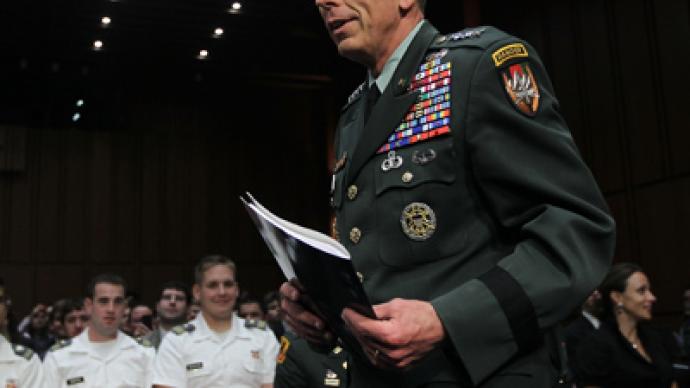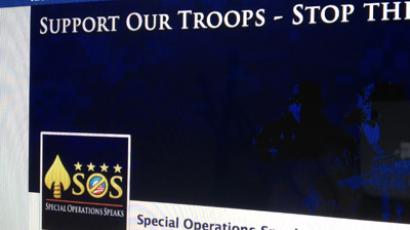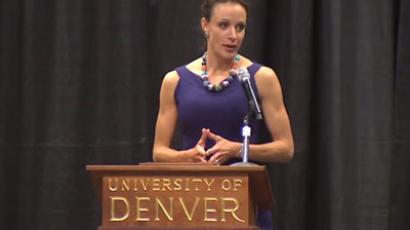Petraeus lied to Congress: Lawmakers say general’s remarks contradict earlier testimony

Retired US Army General David Petraeus testified before Congress this week about the storming of a US consulate building in Benghazi, contradicting previous statements made by the since-resigned CIA chief.
Friday morning’s closed-door session was void of the normal media presence as lawmakers on Capitol Hill grilled Gen. Petraeus for further information about the assault in Libya two months ago that left four Americans dead, including the country’s ambassador. Since the attack on Sept. 12, little has been explained to either the public or politicians in Washington about what really happened before, during and after the consulate was raided in Benghazi. In the immediate aftermath, the White House, State Department and reportedly even Petraeus himself suggested that the assault was likely a spontaneous response to an anti-Islamic film produced in America that had been circulating on the Web. Hours earlier a similar demonstration erupted outside a US embassy in Cairo, Egypt, and the events shortly after in Benghazi were considered to be a copycat protest. In the weeks and months since the attack, however, government agencies have slowly but surely retired that explanation to instead blame the assault on anti-American insurgents, perhaps with al-Qaeda affiliation, waging what is now considered a terrorist attack.Gen. Petraeus testified to that claim on Friday, sources in attendance say, despite previously suggesting the Benghazi incident was spurred by the “Innocence of Muslims” movie.US Rep. Peter King (R-New York) told reporters on the Hill Friday morning that Gen. Petraeus’ latest remarks do not mirror the explanation he offered in the days after Sept. 11."He had told us that this was a terrorist attack and there were terrorists involved from the start," King said to CNN. "I told him, my questions, I had a very different recollection of that (earlier account)," he said. "The clear impression we were given was that the overwhelming amount of evidence was that it arose out of a spontaneous demonstration and it was not a terrorist attack."According to the Associated Press, the current claim that the event was an act of terrorism may have been the CIA’s initial story but was snuffed from the scoop delivered to the public in the days after the attack. Rep. Jim Langevin (D-Rhode Island) says that could have been the result of several agencies switching between classified and unclassified reports in the hours and days after Sept. 11."There may have been confusion with the unclassified talking points. … Perhaps there's greater clarity in the classified talking points," Langevin told reporters on the Hill early Friday. "There were perhaps some subtleties that were used that may have been understood by some to mean one thing, where others may have had a different understanding of words – for example, 'extremist' versus 'terrorist.'"Sen. Kent Conrad (D-North Dakota.) told the press he thought Sen. Langevin’s take could easily explain why Susan Rice, the US representative to the United Nations, painted the tragedy as a protest and not a terrorist attack at first."The confusion arises between the difference between what is classified and unclassified… What is classified cannot be discussed publicly because it would reveal, potentially, the sources and methods used to gather intelligence," he said. "The notes that Ambassador Rice were speaking from were in an unclassified setting… She did entirely the responsible thing by answering questions based on what was unclassified and agreed to by the entire the entire intelligence committee as reflecting their unclassified views at the moment she used those talking points.”Rep. King seemed unhappy with the issue being described as just a mix-up, though, addressing the press with allegations that made Gen. Petraeus seem uncertain of his own statements."He thought all along that he made it clear there was terrorist involvement," King said. "That was not my recollection.""The fact is, the reference to al-Qaida was taken out somewhere along the line by someone outside the intelligence community," King said. "We need to find out who did it and why."Gen. Petraeus’ comments to Congress this week came just a week after he resigned from head of the Central Intelligence Agency since going public with an extramarital affair he conducted with his biographer, Paula Broadwell. Sources on the Hill this week say the general made it clear during his answers that the Benghazi snafu played no role in his resignation.














